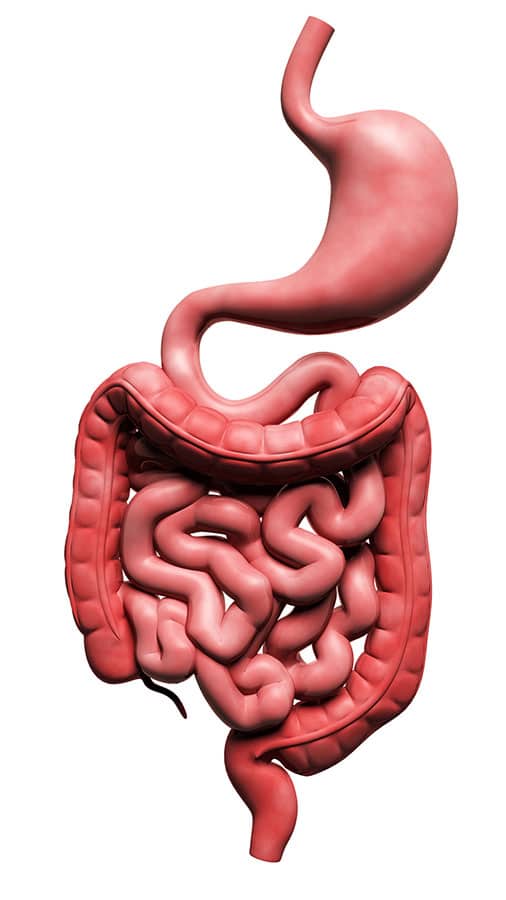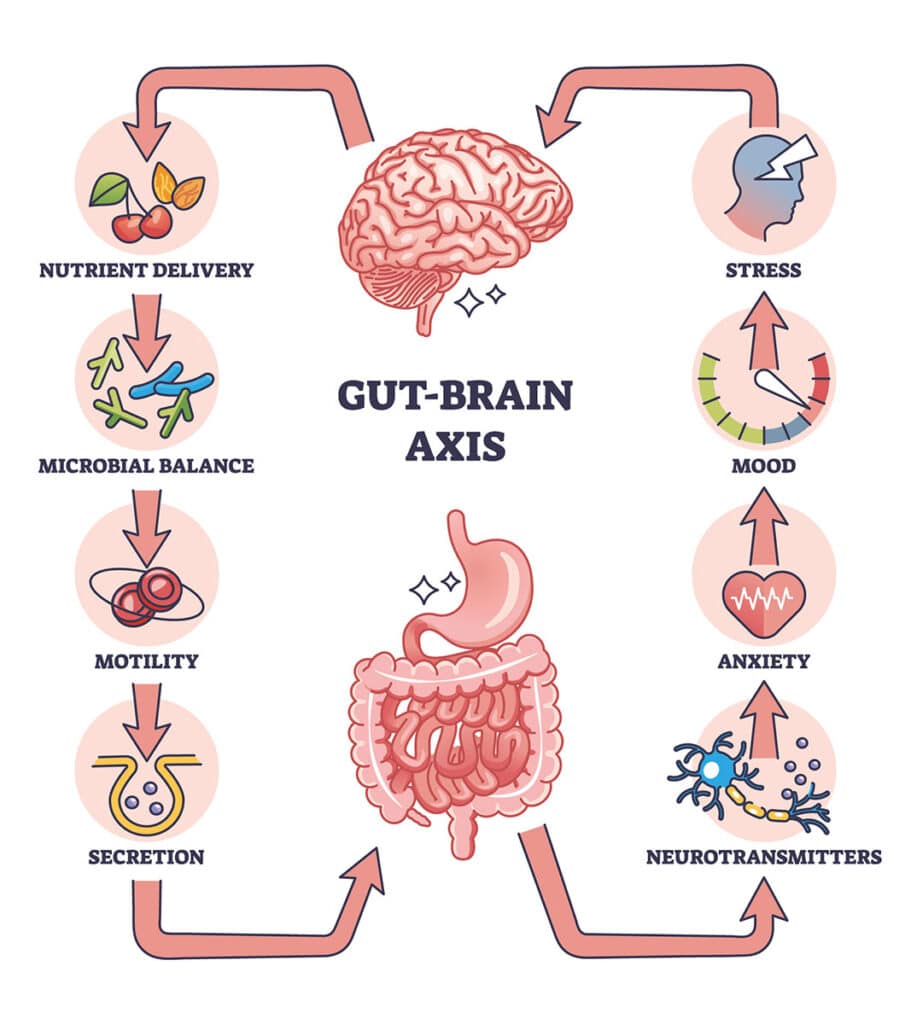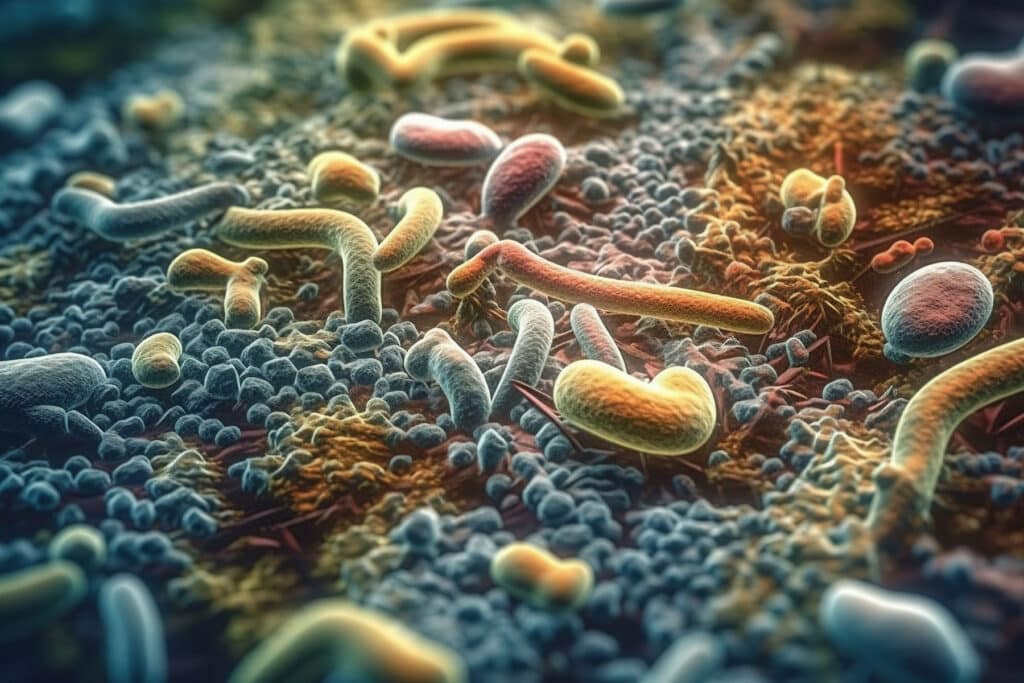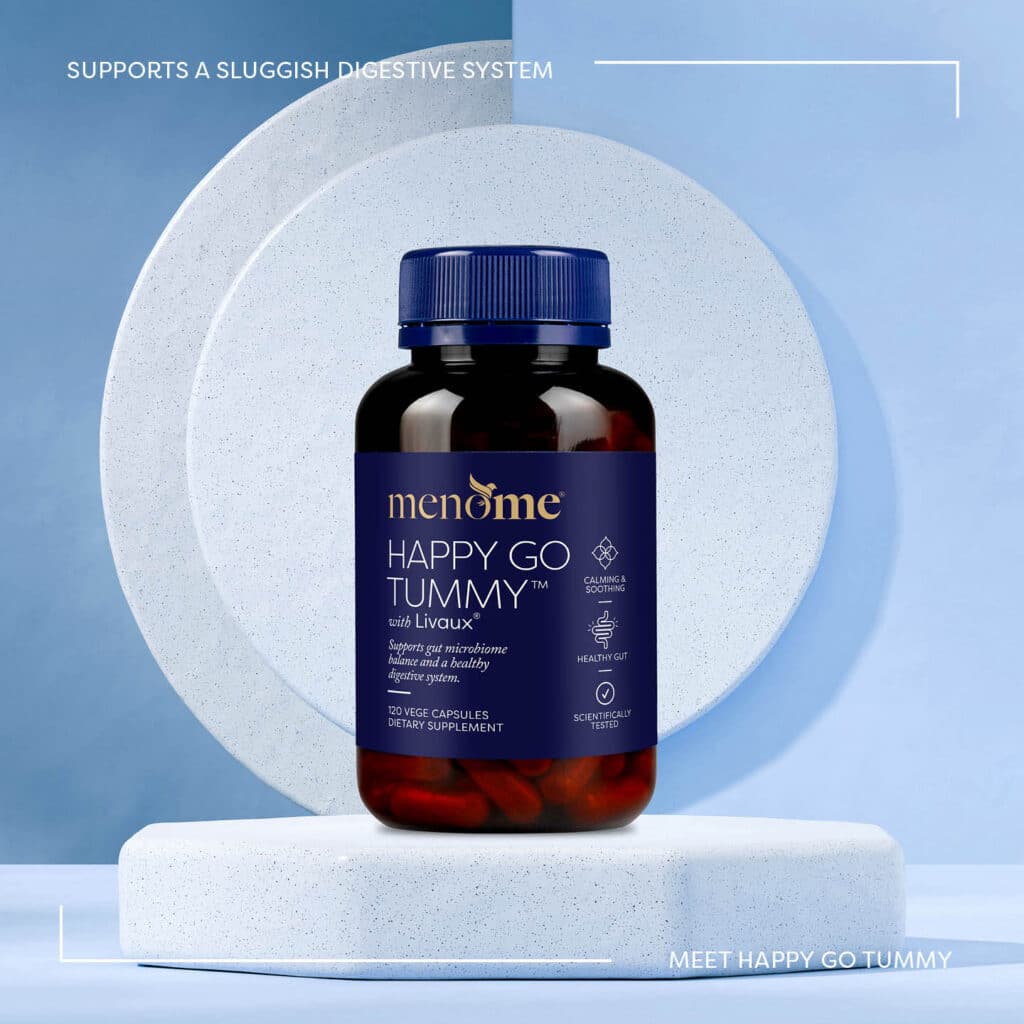12 Signs You Need To Love Your Gut Health For A Happy Menopause

When we’re talking about menopause, a key point is that gut health (aka digestive health) and emotions go hand in hand. Yep, an unhappy gut can mean you feel down, anxious or depressed.
Who knew, right?
Most of us think our emotions are ruled by our brains. But the gut isn’t called the “second brain” in scientific studies for nothing. Indeed, old cliches like “trust your gut”, “gut instinct” and “gut feelings” are rooted in science.
What’s more, several studies have shown the link between the gut microbiome and a woman’s nervous system.

Indeed, we now know it’s also home to many feel-good neurotransmitters such as serotonin most of which is produced there.
But all too often, the digestive health aspect of menopause woes is often overlooked. So let’s go through the signs you need to nurture your gut.
12 signs your gut needs some love
- Anxiety
- Bloating
- Brain fog
- Constipation/diarrhoea
- Depression
- Digestive issues (obviously!)
- Feeling unwell often
- Food sensitivities – how do you cope with dairy and gluten?
- Forgetfulness
- IBS
- Mood swings
- Skin issues such as eczema and acne
How many boxes can you tick?
While this won’t tell you absolutely, positively, completely that digestive issues are your problem it’s certainly something to look at.
So, let’s go through a bit of the physiology, what’s been identified, Jane’s story, and eight daily habits to get into.
Are you ready? Let’s go!
What exactly is the digestive system aka gut?
The ‘gut’ is often the preferred term for the digestive system which is so much more than your tummy.
In fact, it’s made up of a long tube that runs through the body from your mouth, through oesophagus, stomach, small and large intestines, and anus. The lining is actually part of your immune system. This is known as the alimentary canal or digestive tract. And then there’s the liver, gallbladder and pancreas.


The gut-brain axis and your nervous system
As noted earlier, research has identified a connection between the digestive and nervous systems. But it goes even deeper than that because the gut has its very own nervous system. It’s this enteric nervous system that has frequent chats with the brain. Hence the gut-brain axis1.
For example, if you’re depressed or stressed you may find your appetite shifts. In this case, the brain and enteric system may raise a red flag if there’s too much of the stress hormone cortisol floating around and slow digestion down. As a result, you may find yourself constipated.
What’s the link between gut health and menopause symptoms?
The gut or digestive system is actually an amazing ecosystem that’s home to trillions of bacteria. These bugs – both good and bad – are collectively known as the microbiome.
So when your gut is happy and healthy, your digestive system has just the right amount of good and bad guys as well as well-functioning stomach acid. So, this means that when you eat, your system can break down food well and absorb all of the nutrients from the food you thrive on.

But if you’ve got poor gut health or dysbiosis [imbalanced bacteria] you’ll be unable to absorb the nutrients as well.
And this will affect your elimination (poop) frequency and consistency and perhaps cause constipation. Ideally, you want to avoid this at all costs because pooping is important for getting rid of things like unwanted toxins and excess hormones. What’s more, new research published in the Menopause Journal associated elimination issues and constipation with more severe menopause symptoms2.
Further, over time your gut permeability may become affected which can cause a leaky gut. This is when the gut can ‘leak’ toxins, bacteria, and proteins such as gluten into the bloodstream eventually causing havoc such as magnified menopause symptoms and inflammatory conditions.
At this juncture, it doesn’t matter if it’s the rollercoaster of mood swings, headaches, fatigue, anxiety, depression, stress, estrogen dominance or weight gain the finger can often be pointed not just at hormonal shifts but also gut health.
8 daily habits to love your gut

- Hydrate: drink lots of pure, filtered water to help keep all of your systems going.
- Take a probiotic: these supplements help increase your population of good bacteria so they crowd out the bad.
- Embrace prebiotics: probiotics require fibre to thrive and survive and prebiotics are the indigestible fibre they need.
- Eat high-fibre foods: such as fresh fruit and veggies, legumes, quinoa, and brown rice. (Chia seeds are amazing.)
- Feast on fermented foods: kefir, sauerkraut, miso, kimchi, kefir yoghurt.
- Chew slowly and often: good digestion begins in your mouth so make good use of the enzymes in your saliva to help with the food breakdown process.
- Rest and digest: the tummy loves a good break, especially at night so try to close the kitchen three to four hours before bed.
- Run, don’t walk to get your hands on Happy Go Tummy® – it’s a synbiotic. This means it’s prebiotic/probiotic combination supplement so you’re ticking off points 1. and 2. right there. Happy Go Tummy® contains award-winning Livaux® which is a prebiotic from Kiwifruit pectin. This four-minute video will tell you more about Livaux®’s incredible benefits.
Jane’s journey with improved gut health, mental wellbeing and menopause
Meet Jane, a successful career woman.
She’s always been a go-getter, but as menopause crept in, she felt like her body and mind were in turmoil. Her energy levels plummeted, mood swings became the norm, and her sleep patterns became erratic. Jane knew she needed a solution, and that’s when she began her quest to balance her menopausal symptoms by optimising both her hormones and her gut health.

Jane had read about the scientific studies that show a strong connection between gut health and mental wellbeing as well as the influence of the microbiome on mood and emotions.
And she understood the importance of nurturing her gut microbiome as well as her hormones to alleviate her menopausal discomfort.

Her first step was to consult with a holistic menopause and gut health specialist. With their guidance, she developed a holistic plan that included dietary changes and lifestyle modifications to support her gut health. She also began taking MenoMe®’s Perky Post® for hormonal support and Happy Go Tummy®, a high-quality synbiotic prebiotic/probiotic combination.
As a result of her dietary changes, Jane’s diet was enriched with fibre as well as probiotics and prebiotics, which together with Happy Go Tummy® helped her nurture a balanced gut microbiome.
She also incorporated stress-reduction techniques like yoga and meditation to foster a healthier mental state for that all-important gut-brain axis.
As the weeks passed, Jane experienced remarkable improvements. Her mood swings became less frequent, her anxiety levels decreased, she experienced far less bloating and the clogged feeling of constipation disappeared.
And by taking care of her gut, Jane discovered first-hand that she was more equipped to deal with the emotional rollercoaster of menopause.

Conclusion
In summary, Jane’s journey through menopause is a testament to the profound connection between gut health, mental health, and navigating this transformative phase of life. By acknowledging this connection and taking proactive steps to maintain a healthy gut, Jane showed women can achieve better mental and emotional wellbeing while they embrace the changes that menopause brings.
Share with a friend
Sign up to our mailing list for the latest news and stories and receive a $5 discount code to redeem on your first purchase, plus receive a 3 step eBook on ways to support your body through menopause…
This site is protected by reCAPTCHA and the Google Privacy Policy and Terms of Service apply.
Related Articles
Resources
- Appleton J. The Gut-Brain Axis: Influence of Microbiota on Mood and Mental Health. Integr Med (Encinitas). 2018 Aug;17(4):28-32. PMID: 31043907; PMCID: PMC6469458
- Exploration of the association between menopausal symptoms, gastrointestinal symptoms, and perceived stress. https://www.menopause.org/docs/default-source/press-release/menopause-symptoms-associated-with-gastrointestinal-symptoms.pdf
Disclaimer
Our articles are a guideline only and should not take the place of medical advice. Any signs and symptoms you are experiencing could be due to a number of reasons. If you’re experiencing ongoing signs please see your health professional.










